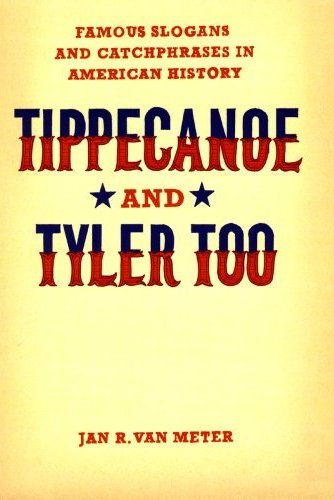
Tippecanoe and Tyler Too: Famous Slogans and Catchphrases in American History
by Jan R. Van Meter
Barack Obama might have been the more praised public speaker, but John McCain too delivered some crowd-pleasers on the campaign trail. The best, perhaps, was his defense of his Iraq war platform, which called for increasing the number of troops there. It had rhythm, it was simple, and it claimed the moral higher ground: “I’d rather lose an election than lose a war.”
Most of his listeners probably didn’t hear the echo of Henry Clay. The respected nineteenth century statesman who was always a candidate, never a president, used to say, with respect to his nuanced position on slavery: “I’d rather be right than be president.” (And so it was.)
This is one of dozens of slogans and catchphrases briefly biographied in Jan R. Van Meter’s Tippecanoe and Tyler Too. The compilation – chronologically arranged by saying – reads like a bullet-pointed, personable history of the country, something like remembering a favorite uncle by the stories he told over and over. Most of Van Meter’s slogans come from wars and presidents – the term “slogan”, he notes, derives from a Scottish term for “battle cry” – with the occasional contribution from sports, newspapers and Hollywood. Van Meter places each in context, exploring the sometimes obscure story of who said what when, and how it was edited.
Some, like the title phrase, are dated – well-remembered, perhaps, but no longer used in new context. They stick, Van Meter suggests, for reasons that are sometimes silly (like rhyme or alliteration) and sometimes apt. For instance, though “Tippecanoe” – William Henry Harrison – died within a month of taking office, the slogan he inspired comes from what many historians count as the first true campaign, complete with speaking tours and media coverage.
Other slogans remain simply because they are so strongly associated with the men who uttered them, and the historical moment in which they were uttered, like “Give me liberty or give me death,” “Ich bin ein Berliner,” and “I have a dream.” (And those three are powerful enough that it seems a bit heretical to consider them catchphrases, a term which connotes something more along the lines of “Heeeeere’s Johnny” or “Yabba dabba doo!”)
Van Meter also includes many sayings that have been re-used in new ways. John Winthrop’s “We shall be as a city upon a hill,” Van Meter notes, got picked up by John F. Kennedy and Ronald Reagan (to diverse ends). “No taxation without representation,” though something of a relic, is sometimes used in the District of Columbia’s fight for congressional representation. And some catchphrases are general enough to have passed into everyday usage, like “the buck stops here.”
Most interesting are the slogans originating from lesser-known sources. A child’s letter to the New York Sun prompted the headline, and the phrase, “Yes, Virginia, there is a Santa Clause.” “Say it ain’t so, Joe,” reportedly comes from a disappointed young fan of the baseball player Joe Jackson. And “give me your tired, your poor,” was written by poet Emma Lazarus to raise funds for the Statue of Liberty’s construction. At first it was roundly disliked, as Van Meter notes, for its “transformation of Lady Liberty into Mother of Exiles.” Lazarus died before her words were placed by the statue. “They became,” as Van Meter writes, “the expression of what the nation wanted to believe about itself, rather than what it was.”
Excerpt: From the section on “Go west, young man,” describing New Yorker editor Horace Greeley’s passion for sending Americans westward during an economic panic: “In every issue for the next eighteen months, Greeley wrote on this theme, so much so that he became known as ‘Go West Greeley.’ The irony of the epithet was not noticed. Greeley’s family had taken the well-trodden path from New England to western New York to Illinois and had failed everywhere they settled. Greeley, as a teenager, picked up and sought his future by reversing the direction….”
Further Reading: Lend Me Your Ears: Great Speeches in History, Updated and Expanded Edition and The Impossible Takes Longer: The 1,000 Wisest Things Ever Said by Nobel Prize Laureates




Send A Letter To the Editors